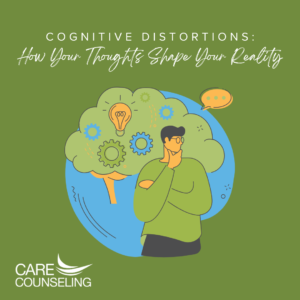Cognitive Distortions: How Your Thoughts Shape Your Reality

Our thoughts play a powerful role in shaping our perception of the world around us. Cognitive distortions are patterns of thinking that can lead us to perceive reality inaccurately, impacting our emotions, behaviors, and overall well-being. Let’s explore cognitive distortions, understand their influence on our daily lives, and learn effective strategies to challenge and replace these distortions with more balanced thinking patterns.
- What are Cognitive Distortions?
Cognitive distortions are thought patterns or beliefs that are irrational and biased, often leading to misinterpretations of situations and events. These distortions can negatively impact our mental health, relationships, and decision-making abilities. They often occur automatically, without us being aware of their influence.
- Common Cognitive Distortions
- All-or-Nothing Thinking (Black-and-White Thinking): This distortion involves seeing things in extreme, either-or terms, with no middle ground. It can lead to unrealistic expectations and harsh self-judgments.
- Overgeneralization: Drawing broad, sweeping conclusions based on one or a few negative experiences if a single event defines all similar future situations.
- Mental Filtering: Focusing solely on negative aspects while ignoring positive ones, leading to a distorted perception of reality.
- Mind Reading: If we know what others are thinking without any evidence, often leading to misunderstandings and unnecessary conflicts.
- Catastrophizing: Exaggerating the significance of negative events and expecting the worst possible outcome.
- Emotional Reasoning: Believing that because we feel a certain way, it must be true, even without objective evidence.
- Personalization: Taking responsibility for events beyond our control or attributing external events to ourselves, assuming we are the cause.
- Should Statements: Using rigid “should,” “must,” or “ought” statements that impose unrealistic expectations on us or others.
- The Impact of Cognitive Distortions
Cognitive distortions can significantly impact our mental and emotional well-being. They can lead to increased stress, anxiety, depression, and difficulty in coping with challenges. These distortions also affect our relationships, as they can lead to miscommunication, misunderstandings, and strained interactions.
- Challenging Cognitive Distortions: Strategies for Change
- Mindfulness and Awareness: Practice mindfulness to become more aware of your thoughts. When you notice cognitive distortions, take a moment to pause and assess the accuracy of your thinking.
- Evidence Evaluation: Examine the evidence for and against your thoughts. Consider alternative explanations or more balanced viewpoints.
- Cognitive Restructuring: Replace irrational thoughts with more realistic and constructive ones. Challenge negative self-talk with positive affirmations.
- Seeking Different Perspectives: Talk to trusted friends, family members, or professionals to gain different viewpoints on the situation.
- Keeping a Thought Journal: Write down your cognitive distortions and the events triggering them. Use this journal to identify patterns and track your progress in challenging them.
- Limiting Media Exposure: Reduce exposure to negative media that may reinforce cognitive distortions and promote biased thinking.
- Practicing Self-Compassion: Treat yourself with kindness and understanding. Accept that everyone makes mistakes, and it’s okay to have flawed thoughts.
- Professional Support: Consider seeking support from a mental health professional if cognitive distortions significantly impact your daily life.
Cognitive distortions can significantly influence our perception of reality, leading to emotional distress and affecting our relationships and decision-making. By recognizing and challenging these distortions, we can reshape our thoughts and create a more balanced perspective on life. Embracing mindfulness, self-compassion, and cognitive restructuring empowers us to navigate challenges with clarity and resilience. As we replace irrational thoughts with more constructive ones, we take a significant step towards improving our mental and emotional well-being, leading to a more positive and fulfilling reality.



























